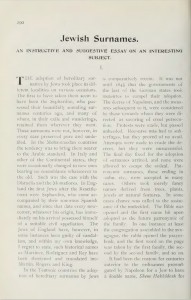 In 1904, a British man named Albert Montefiore Hyamson wrote an article for a US magazine called The New Era Illustrated Magazine. The publication had been founded in 1902 in Boston as the New Era Jewish Magazine, but changed its name when moving its offices to New York shortly thereafter. In 1904 Hyamson was only 29, but would go on to publish many books, including topical dictionaries and many books on Jewish history and Zionism. One book he wrote not that long after in 1908 was A History of the Jews in England, which can be found online.
In 1904, a British man named Albert Montefiore Hyamson wrote an article for a US magazine called The New Era Illustrated Magazine. The publication had been founded in 1902 in Boston as the New Era Jewish Magazine, but changed its name when moving its offices to New York shortly thereafter. In 1904 Hyamson was only 29, but would go on to publish many books, including topical dictionaries and many books on Jewish history and Zionism. One book he wrote not that long after in 1908 was A History of the Jews in England, which can be found online.
Hyamson himself had his own part in Zionist history, first editing a publication called the Zionist Review for the local British Zionist Federation starting in 1917, and by 1921 had gone with Sir Herbert Samuel, the first High Commissioner of Palestine, to the British Mandate to take a position in charge of immigration. He served in that position until 1934 when his penchant for not delegating work had caused a nine month backlog in immigration applications, but not before angering much of the Jewish population for enforcing Britain’s strict immigration rules. Hyamson would later, become a leader in Jewish opposition to the foundation of a Jewish State. In 1904, however, he was simply a civil servant and a writer, and he wrote the following article on the topic of Jewish Surnames.
The original can be found in a bound copy of the New Era Illustrated at the Internet Archive (pg. 290-297), although I’ve excerpted the article itself so you can just download the relevant pages, and the text is reproduced below. I’ve taken the liberty of adding some additional paragraph breaks to make the text a little more readable here.
Jewish Surnames.
AN INSTRUCTIVE AND SUGGESTIVE ESSAY ON AN INTERESTING SUBJECT.
I.
THE adoption of hereditary surnames by Jews took place in different localities on various occasions, The first to have taken them seem to have been the Sephardim, who possessed their beautifully sounding surnames centuries ago, and many of whom, in their exile and wanderings, retained them wherever they went. These surnames were not, however, in every case preserved pure and undefiled. In the Mohammedan countries the tendency was to bring them nearer to the Arabic standard. In Italy and other of the Continental states, they were occasionally changed to new ones bearing no resemblance whatsoever to the old. Such was the case with the Disraelis and the Alontefiores. In England the first Jews after the Resettlement were Sephardim, who came accompanied by their sonorous Spanish names, and since that date every newcomer, whatever his origin, has immediately on his arrival possessed himself of a suitable civil appellation. The Jews of England have, however, in some instances been guilty of vandalism, and within my own knowledge, I regret to state, such historical names as Martinez, Rodriguez and Rey have been shortened and translated into Martin, Rogers and King.
In the Teutonic countries the adoption of hereditary surnames by Jews is comparatively recent. It was not until 1845 that the governments of the last of the German states took measures to compel their adoption. The decree of Napoleon, and the measures subsequent to it, were considered by those towards whom they were directed as savoring of cruel persecution. Protests were made, but passed unheeded. Recourse was had to subterfuges, but they proved of no avail. Attempts were made to evade the decrees, but they were unsuccessful. The final day fixed for the adoption of surnames arrived, and none were allowed to escape the ordeal. Patronymic surnames, those ending in -sohn. etc., were accepted in many cases. Others took merely fancy names derived from trees, plants, jewels or natural features. In some cases chance was called to the assistance of the undecided. The Bible was opened and the first name hit upon adopted as the future patronymic of the family. In one instance at least the congregation assembled in the synagogue, the rabbi opened the prayerbook, and the first word on the page was taken by the first family, the second by the second family, and so on.
It had been the custom for centuries anterior to the ordinances promulgated by Napoleon for a Jew to have a double name, Shem Hakkódesh for religious purposes, and a kinnui by which he was known to the world. The kinnuyim were chosen for several reasons; on account of similarity in sound, for instance George (Gershoni), Robert (Reuben); by translation or similarity of meaning, Freude (Simchah); because the new name was supposed to have some reference to the original bearer of the old Fischel, Fisher (Moses); or by the formation of diminutives, Mirush (Miriam), Koplin, Kaplan, Kaplin (Jacob). These kinnuyim were the foundations, in many instances, of the newly-adopted surnames.
Across the Atlantic, Jewish names have undergone still more wonderful metamorphoses than in the Old World. Such lucre-smacking descriptions as Milldolar, Barndollar, Cashdollar, are to be found in the United States, and these have been proved to be Americanizations of Mühlthaler, Bernthaler and Käsenthaler, denoting families originating in Mühlthal. Bernthal and Kasenthal, towns in South Germany. From America also such apparently un-Jewish appellations as exemplified in the two following illustrations have come. It is related that a Polish-Jewish immigrant, recently arrived in New York, in the course of his endeavors to make a fortune had to give his name to a gentleman with whom he was contracting business. His appellation, Yankele, not being familiar to his interlocutor, was transcribed John Kelly, and Yankele of Lodz was henceforth known as Mr. John Kelly, of New- York. Under the same circumstances it is stated that Yitzchok became Hitchcock, and the descendants of this particular Yitzchok possibly wonder whence their Anglo-Saxon patronymic was derived. It is interesting to note that etymologically Yitzchok and Hitchcock are the same, the latter meaning little Isaac. Of course these two instances may be apocryphal; they probably are, but they illustrate the origin of many Jewish surnames that would otherwise be inexplicable.
In the earliest years of the world’s history, when the population was far more sparse and scattered than it is now, when the system of human government was that of tribes, of clans, of families, there was far less necessity for distinction between personalities. In those days one name was quite sufficient for an individual in most instances, and it seldom occurred that any further designation was necessary. We read of Adam, of Abraham, of Isaac, and of many others who bore but a single name. When, however, numbers had increased to a more considerable extent and the sole description of Abraham or Isaac became insufficient, individuals were distinguished by explanatory additions to their names. We then come across Joshua, the son of Nun; David, the son of Jesse; Elijah, the Tishbite; Judas Maccabæus, Judas Iscariot and others.
These descriptions were, however, only personal to those to whom they were in the first instance applied, and were in no sense hereditary. The nomenclature of the people remained in that condition for centuries, and the world was some hundreds of years older before surnames in the modern sense became common in Western Jewry. During the whole of this period each particular Isaac or Solomon had an explanatory appendix to his name in order to distinguish him from all other Isaacs and Solomons, and in illustration of this custom it might perhaps be useful to quote some of the names borne by English Jews prior to the expulsion of 1290. In the records of that period we find reference to numerous patronymic names; Aaron fil Isaac, Aaron fil Deudone, Aaron fil Samuel, Abraham fil Aaron, Abraham fil Benedict, Abraham fil Benjamin, Abraham fil Jacob, Abraham fil Rabbi, Abraham fil Vives, Bendit fil Mosse, Deulacresse fil Benjamin, Jacob fil Ysaac, Josce fil Leun. Josce fil Manasse, and dozens of others.
Among local surnames are Aaron do Colcestre, Aaron de Lincolnia, R. Aaron of Canterbury, Abraham de Bristol, Abraham de Norwicz, Amiot de Excestre, Benedict de Faversham, Isaac de Joueigny, Ysaac de Russie (probably the first known reference to a Russian Jew in England), Jacob de Paris, Jacob de Westminstre, Deulecresse de Danemarcia, a Danish Jew; Jeremias de Grimesby. Ursel de Bedeford, and also Josco de Domo Samson (Joseph of the house of Samson).
Illustrating surnames of office and occupation we get Abraham Gabbai, a name still borne in the London community; Abraham Vesq (Abraham the bishop), i.e. the dayan (Footnote 1 – Recent researches have shown that Le Vesq equals Cohen rather than “the bishop”); Abraham Pernas, Benedict le Puncteur, Benedict Pernaz, Benjamin Magister, Deodatus Episcopus, also dayan; Isaac Medicus, Isaac Magister puerorum, a schoolmaster; Jacob Presbyter, Jacob Scriptor, Moses Nakdan, Samuel le Prestre, also Theobald Convert, William Convert and others, ancestors of some of the Conyers families of the present day.
Finally, as surnames derived from nicknames or descriptive of the person are to be found Aaron le Blund, i.e., the fair; Benedict Parvus, the modern English surname Small, Little or Short, or the German Klein; Benedict Lengus, in modern English Long, the progenitor of the Langs and Langes that we know; Deudone cum pedibus tortis, a lame man or a cripple, Duzelina vidua Mossy cum naso, Duzelina the widow of Mossy with the nose, a gentleman whose nose was apparently his most prominent feature; Isaac le Gros — we still have the same surname in the London Jewish community; Isaac Senex, Mosse Juvenis.
Coming to the present-day Jewish surnames we find that the classes into which non-Jewish surnames are divided, namely, patronymic, local surnames, surnames of office and occupation, and nicknames, are all represented.
The first class includes a very large proportion of those borne by Jews, and they are all, with few exceptions, easily traceable. Commencing with Biblical names, and taking Abraham (father of many nations) as the first, we obtain derivatives in Ebril, Abers, Aberl, Abcrlin, Aberlein, Abreska, Aberke (in Hungary little Abraham: the termination -ke or -ka denotes an Hungarian or Slavonic origin). Ebermann (the Europeanized form of Abraham + mann) the frequent Abrahams, the plain Abraham, the shortened Braham, Abrahamson, Abromovitch, Abramovitch and Abramovitz in Russia; Abram, Abrams, and also once Babrahams, borne, I believe, by a converted Jew who wished to disguise his origin. In addition, there are Aberzuss (sweet little Abraham) and Aberlich (dear little Abraham).
From Isaac (laughter) we get of course Isaac and Isaacs with various spellings — recently a family spelling the name Izaaks attained some notoriety — Lachman, Sachs, Sacks, Sack, Saxe, Hickman, Hitchcock, and the diminutives Seckel, Sichel and Zeklin. Lachman is also sometimes derived from Leechman (physician).
From Jacob (a supplanter) the innumerable Jacobs, Jacob, Jacobus, Jacobson, Jackson, Jacobi, Jacoby; Yokelson (the son of little Jacob), Koppel (little Jacob), and the same name reversed as Leppok; Benjacob Koppelovitch and Kaplowitch, equivalents of Jacobs and Jacobson, Kaplan, Kaplin,(Footnote 2 – Kaplan and Kaplin are also derived the Russian from Cohen.) and also Kaufman. This last name, being taken for the German word meaning merchant, has sometimes been Anglicised into Marchant or Merchant. No doubt, in some instances it belongs to the class of occupation surnames which will be dealt with later, but it is also in many instances the equivalent through the Hebrew of Jacob + the termination -mann. We also find Koppellmann, a diminutive of the same.
It is perhaps in place here to explain the termination -mann continually recurring in the course of this paper. In most Jewish surnames the suffix -mann is a contraction of Menachem, the comforter, given to many Jewish boys born in the month of Ab, just as Sabbathai or the Polish-Jewish Shebsel is often given to boys born on the Sabbath. Kaufmann therefore in most cases equals Jacob Menachem rather than merchant. Mann is also a term of endearment used by mothers when addressing their boys.
Kopinski, the Polish, and Scobeleff, the Russian, are also equivalents of Jacobs. Israel (prevailing with God) furnishes Israel, Israels, and Israelson only to Jewish nomenclature.
From Joseph we get Joseph, Josephs, Josephson, Yoish, Yosl, Jessel, Joslin and Joskin, all diminutives; Jessop, not often met with among Jews; Jossel, Josselson, Jocelyn in France, and Josephi. From Simeon (hearing) comes the same name used as a surname, and its diminutive Simnel.
From Judah, meaning confession, are derived Judah, Jewell (a diminutive), Judelson, a son of little Judah, and the female name Judith. From this name also a very large number of the descendants of the patriarchs derive their surnames, although at first sight the derivation may not seem very patent. It will, no doubt, be remembered that Jacob, when near his death, called his sons around and gave to each his blessing. To Judah he said : “Judah is a lion’s whelp. He stooped down, he couched as a lion, and as an old lion; who shall rouse him up?” Basing their authority on this passage, Jews, that is to say the descendants of Judah, in innumerable instances adopted the surname of Lion. In Germany they called themselves Lö, Löwe, Lowe, Lobusch, Löbel, Löwel, Löblein, diminutives, and Ben-Löb; Leuw in Holland; Leon in France and Spain; Leoni in Italy; Leo, Lion, Lionel the diminutive in England, and perhaps also Lyons, in imitation of the English surname. Leon is also sometimes a local surname, as will be shown later. Others adopted the Hebrew form Ben-Ari.
The frequency of zoological names among Jews has frequently puzzled students of the subject, some of whom have come to the conclusion that they are altogether without meaning and are purely borrowed. The founder of the neighboring tribe of Benjamin (the son of my strength) was told that he should raven as a wolf. In the morning he should devour the prey, and at night he should divide the spoil. Hence Wolf in its countless spellings, Lopez in Spanish, Lopes in Portuguese.
“Naphtali is a hind let loose,” and consequently we have Hirsch, Herz, Hertz, Hart, Harris and Harrison in England; Hertzl and Herschell, German diminutives; Hertzen, the son of Hertz, and Hirschkovitsch and Herskovitz in Russian, names that would occupy many pages in a Jewish directory.
Of Ephraim it was told in Genesis xlvii that he should multiply exceedingly. The symbol of fruitfulness was a fish. The name therefore became the equivalent of Ephraim. This name has also sometimes been substituted for Moses, in allusion to his earliest recorded adventure. The Italian name Menasci is derived from Manasseh, from which is also obtained Manasse.
Levi is more often a tribal name than a patronymic, and perhaps ought not to be treated at this point. It gives us Levy, Levi, Levie, Levay, Lavey, Levin, Lewin, Levene, Levien, Lewinson, Levinsohn, Levison, Levenson, Lewinsky, Levinsky, Lewis very often, Louissohn, Lewey, Löwy, Lowy, Loewe, Loewi, Leve, and by a transposition of the two first letters, Elvy. Löwe, translated into English, becomes Lion also. As purely a tribal name we get Halévy and Ha-Levi, and Aleuy and Haliva among the Sephardim.
Issachar was a strong ass couching down between two burdens, and for that reason we count among our names: Achsel, Schulter (ready to bear the burden), and thence through bearan, Bär, Baer, Beer, Bärell, Berlin, Bärusch, Bernard, Berthold, Barnett (Footnote 3 – Barnett, when of Scandinavian origin, means “the child.”) and Barnard.
Other Biblical names used as modern surnames are Samuel, Samuels, Samuelson, Sanvel, Sanville, Zangwill and Saville; Asher, Ascher, Asherson. Assur and Archer; Solomon, Solomons, Salomon, Salaman, Salomons, Salmon, Salmen, Sloman, Slowman, Salom, Salome, Salomone. All Jewish boys born in the year of Alexander’s visit to the Holy Land were named after him. His name became the kinnui of Solomon, and hence the Jewish Alexander and Saunders. Jonas, Jones, and Jonassohn from Jonah; from Gedaliah, Guedalla; Lazarus, Ellosor, Lazar, Lazan, and Lewis sometimes, equal Eleazar; Samson and Sampson; Nathan, Nathanson, Bennaton and Bennoson; Elkan and Elkin from Elchanan; Mordecai; Joel; from Elijah, Elias, Ellis, Ellison, Eliason, Eliasaf, and also Elliot and Eliotson, although I have never heard of Jews bearing either of these last two names; Zacharias and Zachariah; Abelson; Aaron, Aarons, Aron, Aaronson, Aronson, Aronovich and Aronoff in Russia; Joshua; from David, Davids, Davidson, Davison, Davies, Davis, Bendavid; Enoch; from Moses, Moses, Moss, Mosely, Mosessohn, Mosesson, Mossel, the diminutive, and Möise, the Turkish form; Emanuel and Manuel.
From Menachem we get, in addition to the terminal syllables to a great many other names, the following complete surnames: Mann, Man, Menke, Menkin, Menlin, Mandl, Mendl, Mendel, Mendelssohn, Mendelson, Manin, Monitz and Monnish.
Other patronymic surnames are: Phillips and Phillipsohn, sometimes from Philip; Henry, and the Spanish Henriques, which, if derived from Heinrich, mean the home ruler, the ruler of the home — another suggested meaning of Heinrich is “rich in slaves”; Lewis and Louisson; Marks, Marx, Marcus, Marcuson, Marcussen, Marksohn and Marcovitch; Raphæl and Raffalovitch; Anshell, Anschel, Ansell, equalling Angel; Symons, Simmons, Simons, Simmonds, Simon, Symonds; Gabriel and Gabrielson; Pincus; Bensabat. the son of Sabbathai; Benhakok; Joachimson and Joachim; Tobias; Adolphus; Wilks from William; Perez, whence is obtained the name Peru, meaning the son of Peter; Fernandez, the son of Ferdinand. In this class may also be included such names as Barabbas (son of his father).
The second great group into which the surnames borne by Jews may be divided is that which is known under the designation of Local Surnames. The Jews in their wanderings settled or passed through all countries, and with each they have seemingly retained some connection through the surnames that they or their descendants bear. Most of the states of the world have assisted in supplying the names that would fill a Jewish directory; Germany has been especially prolific in the creation of Jewish local surnames. Holland, Poland and Galicia are, however, also well represented, while among the Sephardim numerous names are reminiscent of the Peninsula and Italy.
In some cases from the name borne by a family the wanderings of one of its ancestors can be deduced. Berlinsky was undoubtedly adopted by a native of Berlin who settled in Poland; the Dutch names of Van Weenen, Van Oven and Van Praagh, by natives of the Austrian dominions who obtained their names while in Holland: the first came from Vienna, the second from Ofen, and the third from Prague.
Holland has furnished the following names to Jewish families: Amstell; De Fries, De Vries and Frieser from Friesland; Leeuwarden; Van Staveren from Stavoren; De Winter and Winter from Deventer; Van Gelder from Gelderland; Helder; Neumegen; Scharl, Van Raalte, Bronkhorst, Van Houten, Winkel, Limburg, Van Vlymen, Van Thal (from the valley); Van den Bergh (from the mountain); Vandersteen (from the hill); Van Buren (from the cottages or boors’ houses); Vandersluis, Vandersluys, Vanderlyn, Vander Linde, Vanderlinden (from the lime trees); Van der Velde (from the field); Van Rhyn (from the Rhine); Vandyck and Vandyke (from the cutting); Van de Molen (from mill): Van der Meer (from the lake); Hollander does not always mean a Dutchman, but sometimes one coming from Holland, a small German town.
By far the greatest number of Jewish local surnames in general use have originated in the German states. From Prussia and North Germany come Blanckensee, Rosenberg, Flatau (Flatow), Posen, Posner and Posener from Posen. Schrimm, Woolstone from Woolstein. Königsberg, and its English forms Kingberg and Kingsberg, Landsberg. Birnbaum and its Anglicised equivalent Peartree. Hamburg. Hamburger and Hambro from Hamburg; Hildesheim and Hildesheimer from Hildesheim; Hochheim, Linden, Vanderlinden, a German Jew settled in Holland; Emden and Embden, Bernberg, Schonthal, Summerfield, whence Summerfield — this name has also been derived from the French Somerville—Behrendt. Bresslau and Breslauer from Breslau; Berliner. Berlinsky from Berlin; Bergen, whence possibly Berger, although another explanation has also been found for this name; Dessau and Dessauer from Dessau; Dancygcr and Danziger from Danzig; Edersheim, a slight alteration of Edesheim; Eicholz from Eikholz; Friedländer from Friedland; Grünberg and Greenborg, Goldberg; Hirschberg, Hannover, Hollander from Holland; Hirschberg, Kempner and probably Kemp from Kempen; De Lissa and Delissa from Lissa; Lautenburg, Lindow, Landeshut, Mansfeld and Mansfield, Nordheim, Neuhaus, Norden, Neumark and Newmark, Offenbach, Schönberg, Sternberg and Silberberg.
From other parts of Germany we get Altdorf and Altdorfer, Assenheim, Auerbach, Bamberger from Bamberg; Bischofsheim, Bernberg, Bonn, Bingen, Bloomberg from Blomberg; Brunswick, Brunschwig and Braunschweiger, Cleve and Van Cleef from Cleves, the latter through the Dutch; Cassel; Van Duran from Düren Dreyfus (Footnote 4 – Another derivation of Dreyfus is from the nickname borne by shoemakers in allusion to the three-legged stools they use.), Dreyfous; Treves and Trier from Trêves; Dinkelspiel from Dinkelsbuhl; Dresden, Dresdner and Dresner from Dresden; Elzas, Elsas, Elsaesser and Elsasser from Elsass (PT – Alsace); Ettlinger from Ettlingen; Fuld and Fulda from Fulda; Friedeberg and Friedeberger from Friedberg; Friedländer from Friedland; Gold, Golding and Goldinger from Gelting in Bavaria; Guttenberg from Gutenberg in Wurtemburg; Günzberg, Grünberg, Goldberg, Heilbronn, Heilbron, Heilbrun and their equivalent Alfron; Hart sometimes from Hertingen in Bavaria; Heidelberg from Heidelberg; Landau and Landauer, Landsberg; Leipziger from Leipzig; Löwenstein, Van Mentz and Mainzer from Mayence; Mannheim, Mannheimer and Monheimer from Mannheim; Meininger from Meiningen; Nassauer from Nassau; Neustetel from Neustadtel; Nordheim and Nordheimer, Neuhaus, Neuburger; Newmark from Neumark; Oppenheim and Oppenheimer from Oppenheim; Pass, Depass, Dupass from Pasingas in Bavaria; de Pinna from Pinne; Ratisbonne, Rosenfeld, Schönberg, Schwabach and Schawabacher from Scbwabach; Saalburg, Saalfeld. Sonnenberg, Sonnenfeld. Sachs, Saxe and De Saxe sometimes from Saxony; Schwartzenburg; Strelitzki from Strelitz; Strassburg, Sternburg, Sinsheim, Speyer, Spier, Spiers, Spires, etc.. from Speyer; Tiktin, Wertbeim and Wertheimer from Wertheim; Wynbergen, Weinberg, Warburg, Wetzlar. Worms, De Worms and Wurmser from Worms and Wittenburg.
The Austro-Hungarian Empire supplies in addition to Strauss and Osterreicher, meaning Austrian, the following names among others: Van Adelberg from Adelsberq, Breslan and Bresslauer from Breslau; Broady from Brod and Brody; Budweis, Boss from Bosinga; Crawcour, Krakawer, Krakower and Krakowsky from Cracow; Freudenthal, Friedländer from Friedland; Gratz, Goldberg; Lunzer possibly from Linz; Neubaus, Prag, Prager, Praeger and Van Praagh from Prague; Rubenstein, Rosenberg, Sternburg. Wiener and Van Weenen from Vienna. From Silesia are derived Schlesinger and Schlessinger. It will be noticed that certain names, such as Rosenberg, Grünberg and Neuhaus recur frequently in a gazetteer of the German states.
From Poland come tbe names terminating in -ski. denoting place of origin, and of similar value to the prefix de in French, von in German, and van in Dutch. In addition to such names as Velensky, Willenski and Wilenski from Wilna; Warschawsky from Warsaw; Lubinski from Lubin; Lublinski from Lublin, we derive from Poland Warschauer from Warsaw; Kalisch, Kalischer, Kaliskie and probably Carlish from Kalisz and Kutner from Kutno. From tbe name of tbe province itself we get Poland, Pollock, Polack, Polak, Pollak, Poole, Pool and De Polacco.
ALBERT M. HYAMSON.
For all articles on Jewish names from this site, go to the Names page.
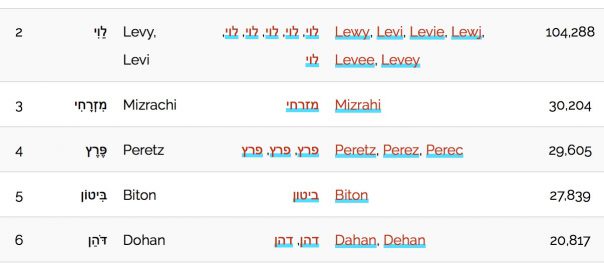
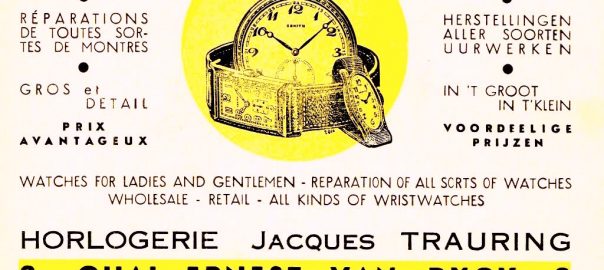
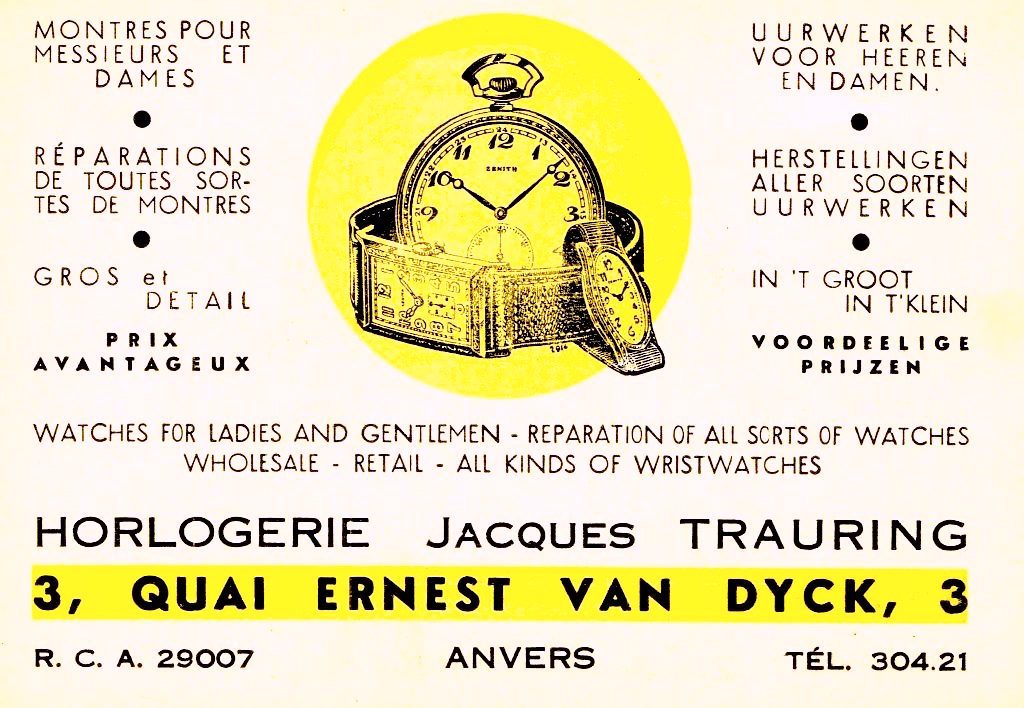
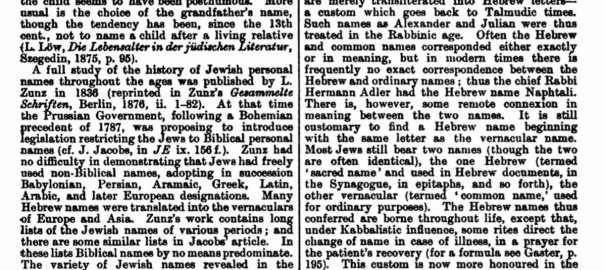
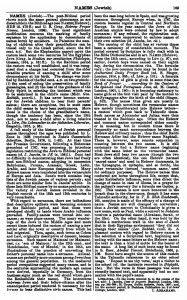 Israel Abrahams was the editor, from 1888 to 1908, of the Jewish Quarterly Review. He taught at Jews’ College, London, before he became a reader of Talmudics at the Univeristy of Cambridge from 1902 to his death in 1925. He was perhaps best known for his work, Jewish Life in the Middle Ages, published in 1896.
Israel Abrahams was the editor, from 1888 to 1908, of the Jewish Quarterly Review. He taught at Jews’ College, London, before he became a reader of Talmudics at the Univeristy of Cambridge from 1902 to his death in 1925. He was perhaps best known for his work, Jewish Life in the Middle Ages, published in 1896.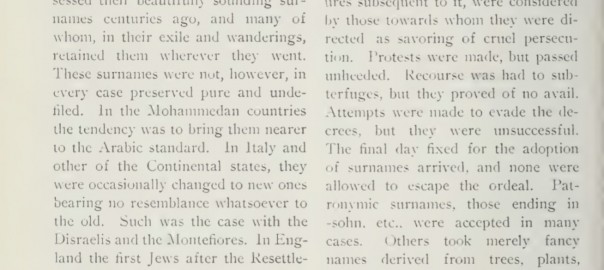
 In 1904, a British man named Albert Montefiore Hyamson wrote an article for a US magazine called The New Era Illustrated Magazine. The publication had been founded in 1902 in Boston as the New Era Jewish Magazine, but changed its name when moving its offices to New York shortly thereafter. In 1904 Hyamson was only 29, but would go on to publish many books, including topical dictionaries and many books on Jewish history and Zionism. One book he wrote not that long after in 1908 was A History of the Jews in England, which can be found
In 1904, a British man named Albert Montefiore Hyamson wrote an article for a US magazine called The New Era Illustrated Magazine. The publication had been founded in 1902 in Boston as the New Era Jewish Magazine, but changed its name when moving its offices to New York shortly thereafter. In 1904 Hyamson was only 29, but would go on to publish many books, including topical dictionaries and many books on Jewish history and Zionism. One book he wrote not that long after in 1908 was A History of the Jews in England, which can be found 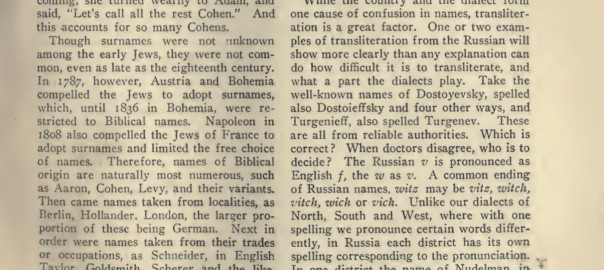
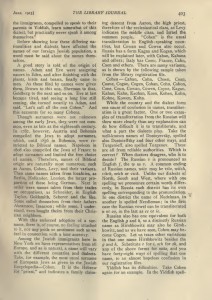 I recently came across this article, published in Volume 40 of Library Journal in 1915. The article, written for librarians obviously, explains the problem faced by libraries in areas with large populations of Jews. The problem addressed is the large variation in names among Jews, something well documented elsewhere but interesting in this article for its practical purpose (signing up library patrons) as long as you can excuse its casual racism.
I recently came across this article, published in Volume 40 of Library Journal in 1915. The article, written for librarians obviously, explains the problem faced by libraries in areas with large populations of Jews. The problem addressed is the large variation in names among Jews, something well documented elsewhere but interesting in this article for its practical purpose (signing up library patrons) as long as you can excuse its casual racism.